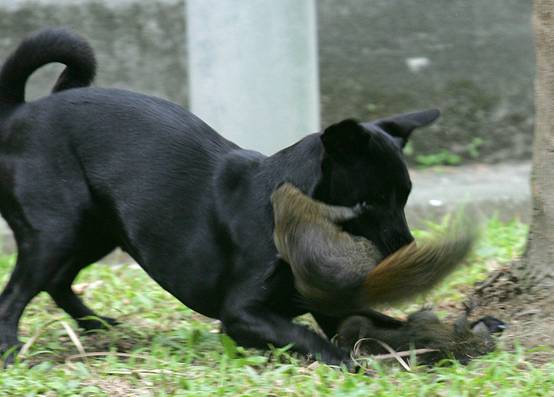Squirrels are prey animals, which means that they fear predators. Cats and dogs may be domestic animals, but they still have predatory instincts to chase squirrels. This may seem like harmless fun to you and your pets, but the squirrels don’t realize that your pets are playing. If your pet actually catches the squirrel, that’s when the real trouble typically begins. You may be able to remove the temptation for your pets and avoid the trouble with professional and humane squirrel removal.
1. Injuries From Altercations With Squirrels
When approached by a potential predator, a squirrel’s first instinct is to escape if possible. Because of their climbing ability, they will usually run up a tree, where a cat may be able to follow them but a dog cannot. However, if a squirrel is cornered by a pet with no escape route, it may fight back in self-defense. They have strong teeth and sharp claws that could do a dog some damage if used defensively. As for cats (and some breeds of dogs), they don’t have as much of a size advantage over squirrels as it might seem, so a squirrel may be able to inflict even more damage.
An altercation between your pet and a squirrel is more likely during the spring. This is a time that squirrels give birth to offspring, and they can be very protective of their babies.
2. Exposure to Diseases or Parasites
Because squirrels are mammals, it is possible for them to be infected with rabies. However, it is unlikely that they could transmit the virus to your pet, or to you for that matter. The most likely way for squirrels to contract rabies would be from the bite of a predator, and in most cases, they don’t survive long enough to become infected. Even if your pet was bitten by a rabid squirrel, if it is current with its vaccinations, this shouldn’t be an issue.
However, squirrels may carry other diseases that could infect your dog or cat if it were to catch them. These are mostly bacterial infections, such as leptospirosis. Such pathogens are also present in the squirrel’s urine and feces, with which your dog or cat could come into contact in the yard and become infected even without actually chasing the squirrels.
Squirrels also carry parasites such as fleas and ticks that also like to feed on dogs and cats. If your pet catches a squirrel, or even if it gets too close, it may contract the parasites. Flea bites are miserable in themselves, causing pain and itching. Tick bites do not hurt, but ticks can transmit diseases to dogs such as canine ehrlichiosis and diseases to both dogs and cats such as Lyme disease and Rocky Mountain Spotted Fever. Flea bites can also infect pets with tapeworms and bartonellosis. Though it isn’t a problem in Madison — at least, not thus far — fleas in the Western United States are known to carry the bubonic plague.
3. Encounters With Other Predators
Squirrels are fairly low on the food chain, meaning that many different predators can and do feed on them, including birds of prey, foxes, and coyotes. If your pet is competing with other predators for squirrels, it may lead to an unpleasant encounter. A coyote or an owl may see a cat or a very small dog as an even more appetizing entrée than a squirrel. A large dog may not be seen as a potential meal, but a fight with a large animal could result in some serious injuries.
How Squirrel Removal Can Help
When there are many squirrels in your yard, it is more likely that they will get into your home, or may already be there. With humane wildlife control in Madison from Skedaddle, the squirrels return to their natural habitat and are encouraged to move on. Their entry sites are sealed so they cannot get back into your house.



